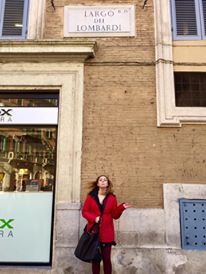After exploring the city that will be my “home away from home” for the next four months, I have realized a few things that really helped or would have helped make my packing, arrival, and first week a lot easier. While some of these things may seem like common sense, it’s important to stress how helpful they may be! It’s okay to feel scared, overwhelmed, and even homesick the second you get on the plane, but it’s crucial to remember that you’re not going through this alone- even if it may feel like you are at the time. If you know of anyone that has gone through this experience make sure to use them as a resource! It’s an amazing feeling to know that you have people to talk to and get tips from as you start this journey.

Piazza Trilussa: it is located near John Cabot University and has helped me gain familiarity with my surroundings. Always pay attention to landmarks you can recognize, in case you get lost.
1. Pack your clothes like you’re going on a two week vacation
This is one thing that I wish I had known before I began packing to go abroad. I know this sounds impossible, but I promise it’s doable. Most airlines allow one piece of luggage to be checked for free as long as the weight does not exceed 50 pounds. If you think about it, that’s not a lot of weight at all. Some airlines will let you check a second bag, but you’ll most likely have to pay an extra fee (in my case it was $100 to bring a second bag). If you’re like me and want to spend as little money as possible, that means that you will need to pack lighter than what you would normally pack for a semester at school. When I started packing my clothes I wanted to bring everything with me knowing I’d be living somewhere else for four months. I was packing long sleeve t-shirts, sweatshirts, shorts, sweatpants, jeans, leggings, skirts, dresses, etc…. I quickly realized that this was wishful thinking. I ended up packing eleven casual outfits in total, and a few athletic outfits. After looking at all of my clothes I came to the conclusion that the amount of clothes I laid out to pack was equal to the amount I would pack if I were going on a two week vacation. Most of these outfits could either be repeated or mismatched with other outfits to create a new one. I wish I had looked at it like this from the beginning because it made packing less stressful. Packing also became easier once I realized that no one is going to care if I wore the same shoes two days in a row. The only people that will be paying attention will be the ones you have classes with, and guess what? THEY’LL ALL BE IN THE SAME BOAT. It’s so relieving once you accept that. You can’t always control the situation that you’re in, or the way people perceive you, so it’s not something that you should be constantly worrying about. And if people are creating judgments about your character based on your clothing, then they’re passing up on a valuable opportunity to know the real you. You should never be put in a situation where you’re influenced to think that your outer beauty indefinitely defines your inner beauty. In reality it’s okay to pack lighter and mismatch pieces of clothing, or even just wear the same outfits over and over! Packing as if you’re only leaving for two weeks will limit the amount of clothes you will take which leaves room for other important things, such as shoes, toiletries, etc., that you need to pack with you as well.

2. Make sure you have enough medicine to last you your entire trip
This may be something as simple as Advil, DayQuil, or even an allergy medicine that you love. They may not always sell the over-the-counter medicine that you normally take in another country. And if they do, it may be cheaper to buy it in your home town and bring it over seas with you. If you have a specific vitamin or supplement that you prefer to take/are required to take, make sure you bring it with you so that you do not risk the chance that they do not sell it wherever you are going. Specifically this tip is important if you take prescription medications. I realize that this is one of those “common sense” things I mentioned earlier, but I did not realize this until I was already abroad. A lot of countries do not allow medicine to be mailed. They will get stuck in customs, and generally do not come out. You might be able to get these items out of customs, but it’ll be a long process that’ll cost you an arm and a leg. It’s easier to order your prescriptions from home and take them with you on your carry-on. (Tip: It is better to pack your medicines in your carry-on in case your luggage gets lost). Some insurance companies can override much medicine you receive per refill, but in some cases they do not cover the entire length of your stay. This is important to know before you leave so that you can discuss this issue with them. I had not been able to reach my insurance company before leaving, so I only had a thirty day supply. I figured I would get an override for the remainder of the time I was here and have my dad mail my medications to me. Once I got to Italy I realized this was not a possibility. The biggest problem with this is that the dosage of my medication varies depending on what brand it is. For the most part, the generic brand and name brand prescriptions will have the same dosages no matter which brand you take. But there are some medications whose dosages change based on which type it is. OF COURSE I take one of those medications, and OF COURSE they only sell the generic brand in Italy, and OF COURSE I take the name brand. In order to get this medicine I will most likely need to have blood work done to make sure that I am taking the right dosage of this medication. I will also need to see a specialist in order to get my other medication prescribed, all because I was unprepared. Moral of the story is : Don’t be like me. Do your research on all of your medications. This includes making sure they are legal in the country you are traveling to- which they most likely will be.
3. Create a separate email account/”label” for study abroad information
If I could start this whole process over, I would create a separate email address just for my study abroad emails- that’s honestly how many I received. I am not exaggerating: I would receive more than ten a week, especially as the application process progressed. Although some applications require your school email address, I wish I would have created a separate email account for these incoming messages. It might sound silly, but I was receiving study abroad emails from three different sources. To study abroad in Rome, St. Norbert, my home institution, works with a program called SAI. Technically I am enrolled at John Cabot University through SAI. I had to apply to study abroad at both St. Norbert and SAI. Therefore; I got emails from St. Norbert Study Abroad, SAI, John Cabot University, and all the regular emails I received on my school account. That was too much information for me to categorize and follow within one email account! It would have made my application process much easier if I had created a separate email account for all of my study abroad information. I struggled my first week here because I had so many usernames/passwords for various school accounts, and could not find them in the scattered emails. While the search feature worked when I needed to find a specific email, but it was inefficient when I was looking for emails with general information. I created a label for my study abroad information at the very beginning of the application process but unfortunately I failed to remember to move my study abroad emails to their designated folder. If you are organized and confident that you can keep track of them, then this is a great method to keep all of your information in one spot! For the time that I was able to keep up with all of this, it made my life ten times easier. I knew exactly where to find what I was looking for! But, if you do not trust yourself to be able to move every single email you receive, I would recommend creating a new email account if possible. You could even create different labels/folders within that account if you were receiving emails from various sources like me!
4. and 5. If you get a phone plan, make sure it works before you get there- or that your phone will work in extreme cases/ LEARN COMMON PHRASES IF THEY SPEAK ANOTHER LANGUAGE OTHER THAN YOUR PRIMARY LANGUAGE (THIS IS SO SO SO IMPORTANT!!!)
Okay long story short- I ordered a phone plan a lot later than I should have before I left for Rome (if you can’t tell I was “super” organized LOL). So I had the option to pick up a SIM card at my orientation which was my best choice as my phone company does not offer any plans for Rome. Well most phones have to be unlocked in order for a new SIM card to properly function. I went to the website my phone carrier provided and did all the necessary steps to unlock my phone. I figured I would only have to fill out the form provided by them and follow the steps on their confirmation email. TURNS OUT I had to connect my phone to my ITunes for my new SIM card to work. Well, I had absolutely no idea about that, so I tried to insert my new SIM card at school on the day of the orientation. Well obviously my phone did not work so I put my old SIM card back in. Well, apparently you “need to be connected to Wi-Fi” to turn on your phone after putting a SIM card in and I did not have my Wi-Fi information for school yet… So, here I am with no working phone on my second day in a new country. I didn’t really think this was going to be a problem because I figured I would walk home with one of my roommates. PLOT TWIST. We all got split up into groups during orientation and none of my roommates were in my group. By the time I was going home it was dark out. So I start walking home alone at night AND I HAVE NO CLUE WHERE I AM OR WHAT I’M DOING OR IF I’M EVEN GOING THE RIGHT WAY!! Which I definitely was not by the way. I cannot tell you how scary this was. I had no way to communicate with anyone, or google anything, or even ask anyone for directions because I couldn’t turn my phone on! I ran into some american speaking students and workers but none of them knew where my apartment was. Eventually I ran into a group that was able to help me, which was a blessing. This was one of the hardest things I have ever had to do.. Two important things to remember: try your best to have a working phone for the first few days you arrive, and learn how to ask for directions/common phrases! “Hi”, “Goodbye”, “Please”, “Thank you”, “Where is…?”, “Do you speak English?”, “Excuse me”, and “How much is…” have been the phrases I have found to be the most helpful in my first week here!

6. Make sure you have some currency of the country you are going to
So you may be asking yourself (if you actually read the last two tips) “Why didn’t she just take a bus or a taxi to get back?!” Wow. That’s a really great question! If you’ve been taking notes while reading this, you may come to the conclusion that I was not as prepared as I should have been for this adventure… For example, I didn’t have any Euro (p.s Euro is singular and plural) with me when I left and didn’t have a chance to exchange currency at the airport. This is not even a joke… Of all common sense things to do, make sure you have enough currency to help in an emergency situation such as getting lost, or needing food. You should also have a brief knowledge of how currency is exchanged so that you are getting your change back correctly! They will most likely know you’re American, so they may give you incorrect change thinking you will not know the difference. It’s also a good idea to do some research about credit card/debit card usage in the country you’re going to! I found out that in Italy most taxis will generally take a debit card as form of payment, which would have been something really great to know while I was lost. Some restaurants will also take these cards. (Helpful Hint: Most of them offer free Wi-Fi, too!) If you plan on using your card while you’re abroad it is ESSENTIAL to make sure your bank knows you are leaving the country. If you forget to tell them, most banks will think your card has been stolen and not allow you to use it. Surprisingly I actually called my bank before I left which was a small win for me, and I need all the W’s I can get! When you call your bank, they will generally ask you a few questions. Most of them are along the lines of “Where are you going?”, “How long will you be there?”, “Are you planning on traveling anywhere else?”, etc. This is just to make sure you don’t have any problems if you plan on traveling. You will also need your credit card information with you on this call. While on this phone call, it may benefit you to ask how much the foreign exchange rate is when you use your card or take out money from an
ATM! Make sure you are using reliable ATMs to take out money while you are abroad. Some machines are scams!!

7. JET LAG… But really, it’s okay to sleep after a long flight
After my flight, so many people told me I shouldn’t take a long nap when I got back to my apartment because I needed to adjust my sleeping schedule to the time here- which makes sense if you think about it. If there is a time difference between the country you are going to and the country you are from, often you will be exhausted from a long flight. You’ll probably want to sleep when you get to your new place. Many people recommend to try to make it through the night so that you can adjust to the time changes. But, if you’re someone that can sleep until noon every day then you may not have this problem. If you generally sleep a lot, or have the ability to, you may not feel these same effects. My plane left at 4:30 PM Monday evening. After a ten hour flight and a two hour layover, I had finally arrived in Rome at noon Tuesday afternoon. I didn’t get to my apartment until 3:00 PM. Most people suggested that I try to beat the “Jet Lag”. I took a really long nap from 3:00 PM to 8:30 PM and still went to bed at 11 PM. I slept until 8 AM the next morning. I had no problem sleeping the next night or the rest of the week. Most of the people who were on the same flight as me were complaining about Jet Lag for that whole week after we get to Rome. Some bodies can beat jet lag and sleep for hours, but others will be effected for a week after. If you know your body, and are confident that you can sleep, then you can absolutely sleep. Don’t think that jet lag is a definite thing for everyone!
8. Contrary to popular belief you do not have to see everything in your first week!
Some people have the energy and excitement to be able to roam around a brand new city for hours a day. But if we can take a moment to be honest for a second: meeting new people and seeing new places is exhausting! I absolutely love meeting new people and building new relationships, but it can be very tiresome. Think about how much energy and brain power you use! It may not seem like it at first because you’re having fun and making connections with people, but generally when we meet new people our brain is constantly turned on. You’re scaffolding new information into folders in your head to organize the things they’re saying and reorganizing it based on the connections you make with them. Think about how many people you meet during a regular week. Now think about how many people you meet when you move, or start a new school. You use the same brain power and thinking processes when you’re in an unfamiliar environment. You always have to be on the lookout so you know how to get back to a familiar point if you get lost! That takes so much thinking, and it’s okay to turn your brain off for a few hours every day. Most of the things you want to see and experience will still be there in a few weeks when you’re settled in and comfortable with your surroundings. If you’re comfortable and ready to go out and explore, then by all means take those opportunities! But don’t feel like you NEED to just because you’re in a new spot. If I’m going to be honest, I haven’t tried gelato yet… and I just had my first cappuccino today. Some people think it’s crazy that I’m in Italy and haven’t had all the “generic Italian things”, but these small expenses add up fast! A cappuccino every day, or twice a day, adds up even though it’s only 1.10 Euro for a single cup. If you’re tight on money like me, it’s okay to take it slow and ease into it. When I first got here, I wanted to try everything and go everywhere! The Vatican, the Colosseum, Trevi Fountain, etc. I soon realized how unrealistic it was considering I didn’t even know how to get to school and back yet. I did explore a little bit because it’s good to know how to get around, but trying to fit EVERYTHING in is impossible! One thing I’ve heard from previous students is that they wished they did not travel as much and got to experience the culture of their residing city more. So it’s totally okay if you didn’t get to see or do everything you wanted in your first week. There will be plenty more!

9. Embrace Not Always Knowing
The fact of the matter is if you don’t know something, then you don’t know it. The only way you can actually learn is by asking questions and finding solutions to your questions. It’s okay to ask questions! That’s the only way you will figure it out. Being in a situation with so much uncertainty will create this newfound empathy. If you consider yourself an empathetic person to begin with, then this will help you grow even more. Empathy is a driving factor of your professional, and most importantly your personal growth. When we are empathetic, we understand/relate to what others are going through. It may seem like you will never find your way around a new area, but I promise that feeling does not last forever. Although I’ve only been here a week, I’ve started to get a sense of direction. It’s strange seeing people wander confused, unsure of their surroundings. That was me just four days ago, and now I’m watching as if I really know any better than them. Embrace feeling like a tourist, an outsider, and feeling different. This is an important skill to take with you. Your empathy will grow for anyone in a situation where they feel unwelcome, or like they don’t fit in. This doesn’t necessarily mean that you should be timid, but look at it from a different perspective. Instead of seeing this as a disadvantage, look at not always knowing as an advantage that will help you later in life. This is something that the Dean of John Cabot told me on my third day here. Her advice as a successful member of society is to embrace being uncomfortable with your surroundings. I guess sometimes you need to work for the abstract ideas more than the concrete details. So my advice to you is to embrace not always knowing because no feeling lasts forever, no matter how much you may want it to.
10. Don’t let the communication barrier discourage you
It’s definitely scary going into a country that you do not know, especially when they speak a language you cannot understand. But you can’t let this intimidate you or discourage you! I’ve been very timid to try to speak in Italian while I have been here. I am not familiar with this language whatsoever. But, I have noticed the appreciation people give you when you at least TRY to say things. Although it may be scary, you are a visitor in a foreign country. They are not required to speak English, so do not expect them to. Some people are very good at speaking English while others struggle. I will say most of them try even though English is one of the hardest languages to learn. The least we can do as visitors is try our best. Most people show you a sense of respect when you put in the effort to communicate with them. One option is to print off a cheat sheet of phrases/questions/words you would like to say. If you need to take out the paper that’s totally okay! The point is that you are trying. You might be discouraged to do so but you honestly just need to have confidence. Confidence is a hard thing to just “have” over night, but it’s something you will benefit greatly from in another country. If you doubt yourself, other people will doubt you too and possibly recognize that. You will already stand out because you are unfamiliar with their societal customs, so being timid could possibly make you a target and eventually lead to a situation where you may feel taken advantage of. There is definitely a difference between being unsure and being timid. This is something to keep in mind: You can be unsure but still show initiative to solve the problem. Being bold and confident in the way you ask for help is very useful. Being timid means you are too scared to try to figure it out. It’s a less active approach to gaining an understanding of the social norms, expectations, and daily routines are of another country. The faster you pick these up, the more confident you will be! It’s kind of like driving for the first time… the first time is usually an absolute train wreck… but eventually you have to become confident or you’ll most likely going to get hit by the oncoming traffic while you’re trying to turn left. I know it’s hard and scary, but it’s so helpful to just TRY and fully submerge yourself in another culture. I was actually having trouble with this in my first few days until I had a heart-warming experience. I was walking and accidentally bumped into two gentleman walking down the road. I said “Scusi”, which means “excuse me”, or in this case “sorry”, in Italian. At the same time, one of the gentlemen said “Oh, I’m sorry”, with a thick accent which was clearly Italian. I have never felt so much appreciation for my ability to communicate with people. I was the stranger in another country and HE spoke to ME in ENGLISH!! It’s remarkable to see how many people apologize when they try to speak to you in Italian and realize you speak English. They actually apologize for this as if it’s their fault I’m in another country and don’t know how to speak their native language?! As Americans we have the privilege to go to school starting at a young age and begin to build communication/fundamental skills to succeed in life. We often take these opportunities for granted and have a self-concerned approach to living. As a study abroad student, you have an incredible opportunity to experience this privilege in another country. The least you can do is embrace this opportunity with full arms. You’d be surprised how much your verbal and nonverbal communication skills can grow in a week (:
Ami is a SAI Rome student in Spring 2017 from St. Norbert College.


Comments
No comments yet